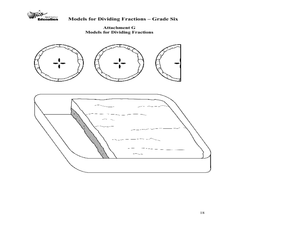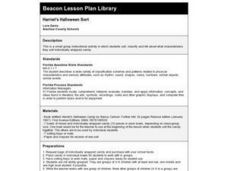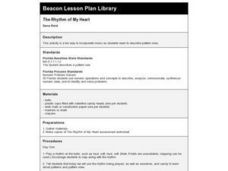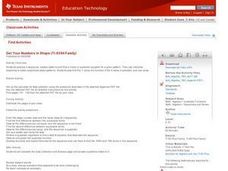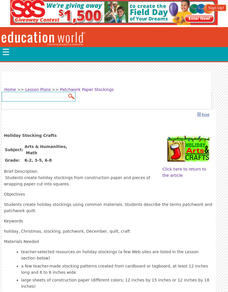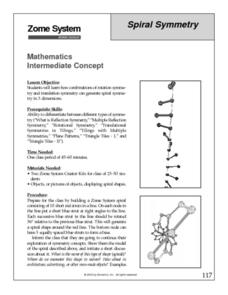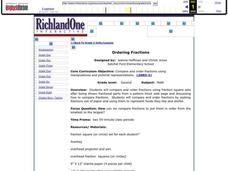Curated OER
Writing Variable Expressions for Physical Models
Explore the concept of writing variable expressions by examining the similarities between expressions with numbers and expressions with variables. Emerging mathematicians determine rules for sequences and patterns before writing a rule...
Ohio Department of Education
Models for Dividing Fractions - Grade Six
Fifth and sixth graders use food and candy to help them represent division of fractions and develop algorithms to solve fraction problems. They discuss dividing whole numbers by fractions. Pupils use sticks and chocolate bars to study...
Curated OER
Harriet's Halloween Sort
Students listen to the book, Harriet's Halloween Candy, and discuss the many ways Harriet sorted the candy from her trick-or-treat bag. They sort and classify individually wrapped candy.
Curated OER
The Rhythm of My Heart
First graders describe pattern rules. They use the rhythm being played on a bell and candy hearts to explore patterns and pattern rules. This is an especially good lesson to use around Valentine's Day.
Curated OER
Level 1 Test (2) Math Assessment
In this math assessment learning exercise, students complete a 60 question multiple choice math test on all grade 1 skills. Note: There are grammatical errors in some questions.
Curated OER
Get Your Numbers in Shape - TI-83
High Schoolers use the TI-83 calculator to produce a sequence, explore patterns and find a linear or quadratic equation for a given pattern. They use inductive reasoning to make conjectures about patterns. They find the Y-value of a...
Curated OER
Probability Using M&M's
Students estimate and then count the number of each color of M&M's in their bag. In this mathematics lesson, students find the experimental probability of selecting each color from the bag. Students create pictographs and bar graphs...
Curated OER
Relate Counting to Addition and Subtraction
Find 10 simple word problems that require addition and subtraction skills. Although these offer clear math procedure, the grammar isn't perfect. The highest number your learners encounter here is 40, and each question has room for...
Curated OER
Gummy Bear Sorting
Learners demonstrate knowledge of sorting and classifying by color as they sort gummy bear candies.
Curated OER
Maximize Your Product
Students complete multiplication problems in real life situations. In this multiplication lesson plan, students complete 2 digit problems in a "Carnival Candy" problem.
Curated OER
Finding Fractional Parts Using an Area Model
Students explore math functions by completing a problem solving worksheet in class. In this division lesson, students utilize visual aides such as marshmallows and candy to visualize the act of division. Students complete a division...
Curated OER
Models for Dividing Fractions
Sixth graders represent division of fractions using manipulatives, such as freezer pops, candy bars, and models such as drawings squares. They develop an algorithm from these examples and solve problems using fractions.
Curated OER
Integrating Mathematics Into Literature
Young scholars discuss tables, multiples, fractions, ratios, and probability while participating in daily activities in this cross-curricular Math lesson using examples from Literature. State standards in Mathematics are addressed over...
Florida Center for Instructional Technology
Integrating Mathematics into Literature
You class will read Cucumber Soup by Vickie Leigh Krudwig as an anticipatory set for this lesson on ratios. They make models of the insects in the story and then use them as a source of data for this ratio and proportion lesson. This...
Curated OER
Sweet or Sour, Like or Different
Students watch a video on comparisons and discuss ways in which objects can be sorted. They play an identification game with a lemon and discuss identification characteristics.
Curated OER
Skeeter Populations and Exponential Growth
Students perform investigations on the growth of populations and use exponential functions to represent that growth. They watch a video clip of growth patterns. Students work in groups to determine the "population" of each color of...
Curated OER
Fair Shares and Geometric Spirals
Students tackle the problem of how to divide a triangular piece of land fairly among four people. They decide whether their method of fair division always works or if it only works in special cases.
Curated OER
Multiplication Snack Activity
Youngsters study multiplication facts by manipulating food in order to problem solve. They will use healthy snack items as manipulatives to solve various multiplication equations. Charts, tables, physical models, and so much more are...
Curated OER
Patchwork Paper Stockings
Youngsters create holiday stockings from construction paper and pieces of wrapping paper cut into squares. It's always nice to have a holiday craft, or two, up your sleeve during December. This craft is easy to implement, and the...
Curated OER
Spiral Symmetry
Taking the notion of symmetry to the next level, this looks at combining rotation and translation symmetry to build spiral symmetry in three dimensions. Using the Zome modeling system and an instructor’s guidance, geometers try to build...
Curated OER
Ordering Rational Numbers and Finding Their Approximate
Middle schoolers explore the concept of ordering rational numbers on a number line. They represent rational numbers as decimals and percents. Pupils create a foldable about converting fractions to decimals to percents, and use a...
Curated OER
Ordering Fractions
Second graders use shapes to create various fractions. In this fractions instructional activity, 2nd graders define a fraction, visit a website where they make fractions using various shapes, and use a fraction square set to create and...
Curated OER
Let Us Be Sensible
Students describe the five senses. They perform an investigation using sensory organs associated with each of the senses. Students identify, describe and extend repeating relationship (pattern) found in common, objects, sounds and...
Curated OER
A Trip to the Toy Store
First graders recognize and identify the value of a penny, nickel and dime. They spend play money in a simulated toy store and match their coins to the purchase price of a toy of their choice.



